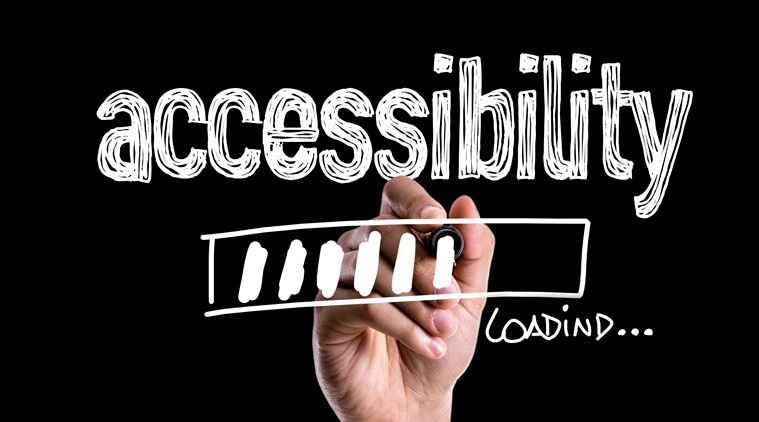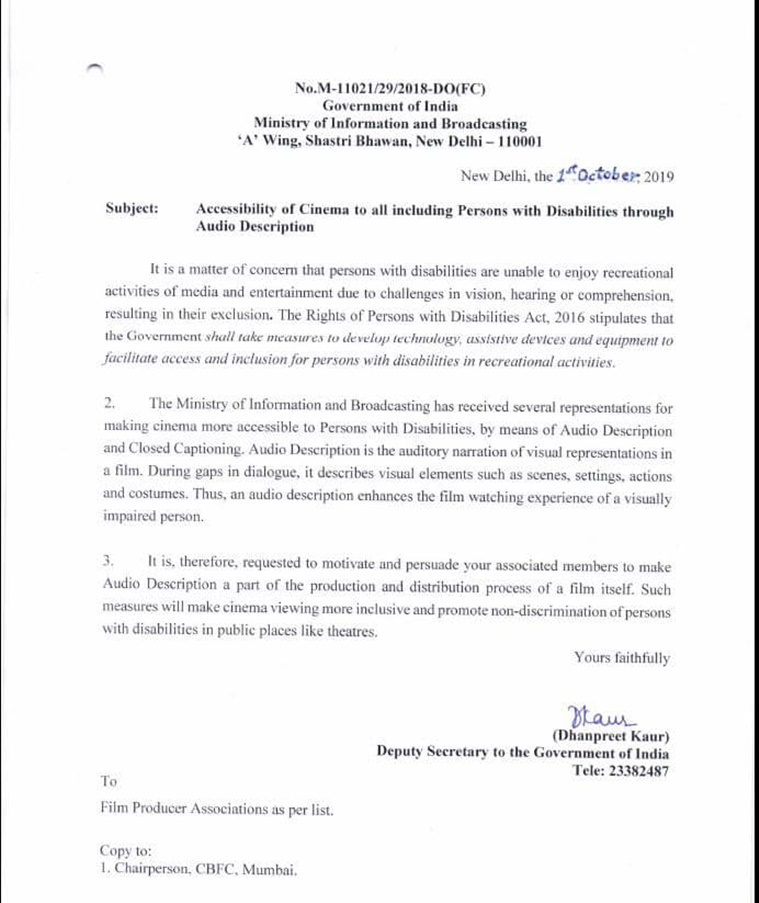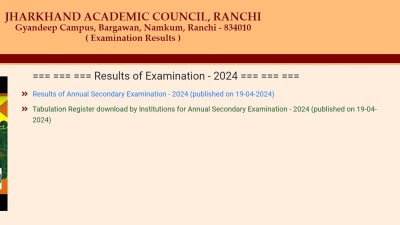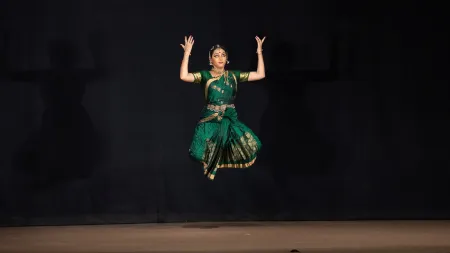- India
- International
Accessible cinema: Govt asks filmmakers to make audio descriptions part of production
However, since the costs for audio descriptions increase to about 2.5 lakhs per film, a film at least needs to release in 700 screens.
 Audio descriptions and closed captioning could change the way Persons with Disability consume cinema. (Source: Getty Images/Thinkstock)
Audio descriptions and closed captioning could change the way Persons with Disability consume cinema. (Source: Getty Images/Thinkstock)
In a step towards making cinema accessible for persons with disabilities (PwDs), the Information and Broadcasting Ministry has issued a new directive to Central Bureau of Film Certification (CBFC), to use audio descriptions and closed captioning in cinemas. In its letter dated October 1, 2019, a copy of which has been provided to representatives of the disability sector, including activists and multiplex chain companies like PVR on October 12, the MIB states that in keeping with The Rights of Persons with Disabilities (RPWD) Act, 2016, “it is requested to motivate and persuade your (CBFC’s) associated members to make audio description a part of the production and distribution of a film itself”.
 The Ministry states that in keeping with The Rights of Persons with Disabilities Act, 2016, “it is requested to motivate and persuade your (CBFC’s) associated members to make audio description a part of the production and distribution of a film itself”. (Nipun Malhotra/Facebook)
The Ministry states that in keeping with The Rights of Persons with Disabilities Act, 2016, “it is requested to motivate and persuade your (CBFC’s) associated members to make audio description a part of the production and distribution of a film itself”. (Nipun Malhotra/Facebook)
According to the Ministry, “such measures will make cinema viewing more inclusive and promote non-discrimination of PwDs in public places like theatres.”
Section 41 and 42 of the RPWD Act 2016 states that all electronic content should be accessible and focus on inclusion for PwDs.
Lending support to the ministry’s call and sharing that he is “thrilled that after multiple representations and RTIs” by him and various representatives from the sector, the Ministry has taken positive steps, disability rights activist Nipun Malhotra told indianexpress.com that the move was “long overdue”.
“I wouldn’t say I am happy or disappointed but I am glad it happened. It was long overdue. There was pressure from all sides on the Ministry because even the RPWD Act calls for all electronic content to be accessible through language, technology and the like,” he commented.

Audio descriptions mean that all visual representations in a film including gaps in dialogue and visual elements like scenes, settings, actions and costumes would be described through auditory narration using technology for visually-impaired persons, which enhances their film-going experience.
In closed captioning, the subtitles can be turned on or off by the viewer as per their convenience, which can be useful for hearing-impaired persons but is currently not practical in theatre settings in India. This is unlike the UAE, where Arabic captions are mandatory for all films, while American theaters are supposed to provide access to closed captioning as part of the Americans with Disabilities Act (ADA), through a caption-displaying device available on request like CaptiView.
“It was two-and-a-half months ago that I had written a letter to MIB and CBFC requesting for audio descriptions and closed captioning. This is the first time that something on cinema, an entertainment medium for all is being done. I am hopeful that if this was to be actually implemented across the country, a lot many issues that a PwD faces can be countered,” said Malhotra.
Arman Ali, disability rights activist and executive director at National Centre for Promotion of Employment for Disabled People (NCPEDP), said, “When we talk of equal rights for PwDs, we tend to focus on the more tangible and urgent — education and employment. But media, entertainment and information are equally important. People with hearing or visual disabilities should not be denied access to information, be it access to news, television and also films. We just wish that instead of a request to the Film Producers Association, it was a more binding directive,” he said.
Adopting NGO Saksham’s audio-described works using UI-enabled app XL Cinemas that synchronises audio-described tracks onto movies, films like Ranbir Kapoor’s Sanju, Ayushmann Khurrana’s Andhadun, John Abraham’s Romeo Akbar Walter (RAW) and Nawazuddin Siddiqui’s Thackeray opened to audio descriptions at PVR Cinemas, a couple of weeks after the initial release. Till now, more than 12,000 people have used the audio captioning feature available on the app.
 Ayushmann Khurrana’s Andhadun had audio descriptions, a few weeks after the release of the film in 2018. (Source: File Photo)
Ayushmann Khurrana’s Andhadun had audio descriptions, a few weeks after the release of the film in 2018. (Source: File Photo)
Co-founder of XL Cinemas, Kunaal Prasad explained, “The minister heard everyone out and he was of the view that ‘if technology could be used, then what’s the hiccup?’ In India, movies are in big demand and a mainstream way of entertainment. While audio descriptions, which itself began in 1983-84 are not something new, the delivery has always been a challenge because of transcriptions and the cost of equipment involved. But through an application, the entire process is smoother.”
The app can be downloaded and used by anyone. It generates an audio ticket for free. When the user is inside a theatre for a film (after buying a usual movie ticket) that has audio descriptions available, the app will sync. By using the audio ticket, you can hear the dialogue in the languages available. For example, you could go to a Tamil screening of a film and hear the dialogue in Hindi. The app offers both services, choice of language and audio description.
Notably, the audio description of movies was first taken up comprehensively by the American Council of the Blind in 2009. But now they have laws in the US which require certain hours of described prime time programming by cable networks. There are more than 750 titles under Netflix which are audio-described.
“They are buying a ticket to experience the film. It is a win-win situation. The move by MIB is a good start. Let’s hope it is not an eyewash and is checked at the censor level itself,” Prasad told indianexpress.com.
Malhotra recommends, “A film shouldn’t be certified if they don’t have audio descriptions as per the RPWD Act.”
Dr Alim Chandani, a disability rights advocate for the hearing-impaired, agrees that it is “mandatory” to provide accessible services to the deaf community and therefore, subtitles in cinema should be mandatory. “I am a deaf person and I love Bollywood movies. Lately, I have gone to see some hit movies such as Joker or The Sky is Pink (both subtitled in English) and the seats were full! I think the challenge would be the cinemas (houses) being worried about whether the audience would want to watch movies with subtitles or not,” shared Dr Chandani.
However, since the costs for audio descriptions reportedly increases to about 2.5 lakh per film, it at least needs to release in 700 screens, mentioned Prasad. “It is a small start. If a commercial film can be a breakthrough, then there is no stopping accessible cinema,” he said.
Sangeeta Padmanabhan, entertainment consultant, indianexpress.com Malayalam shared that costs are decided by the scale of production as there is no standardisation of post-production costs. “It might be two-five per cent of the cost of post-production which is not a big deal for production houses,” she explained, adding that while the move is to be appreciated, “not laying out its implementation by the Ministry/film production houses or authorities concerned won’t help the cause”.
Prasad concurs that the while the challenge is to make cinema viewing more inclusive in India for the visually-impaired, getting across to production houses to let go of rights for their movies to be audio-described is another challenge. “India is the blind capital of the world. Imagine if entertainment could actually reach out to all. I feel that when cinema is accessible, then accessibility in its truest sense is possible,” said Prasad, who has roped in Zee Studios and Viacom18 as of now for their movies to be audio-described.
While applauding the “progressive move”, Neeraj Joshi, head marketing, Zee Studios which has a “few properties using audio descriptions and subtitling” pointed out that the idea is to also not make cinema a “boring or cumbersome experience for viewers including persons with disabilities”. “It is definitely a first step and we look forward to making it simpler and accessible for the audience,” he said.
Apr 19: Latest News
- 01
- 02
- 03
- 04
- 05


































